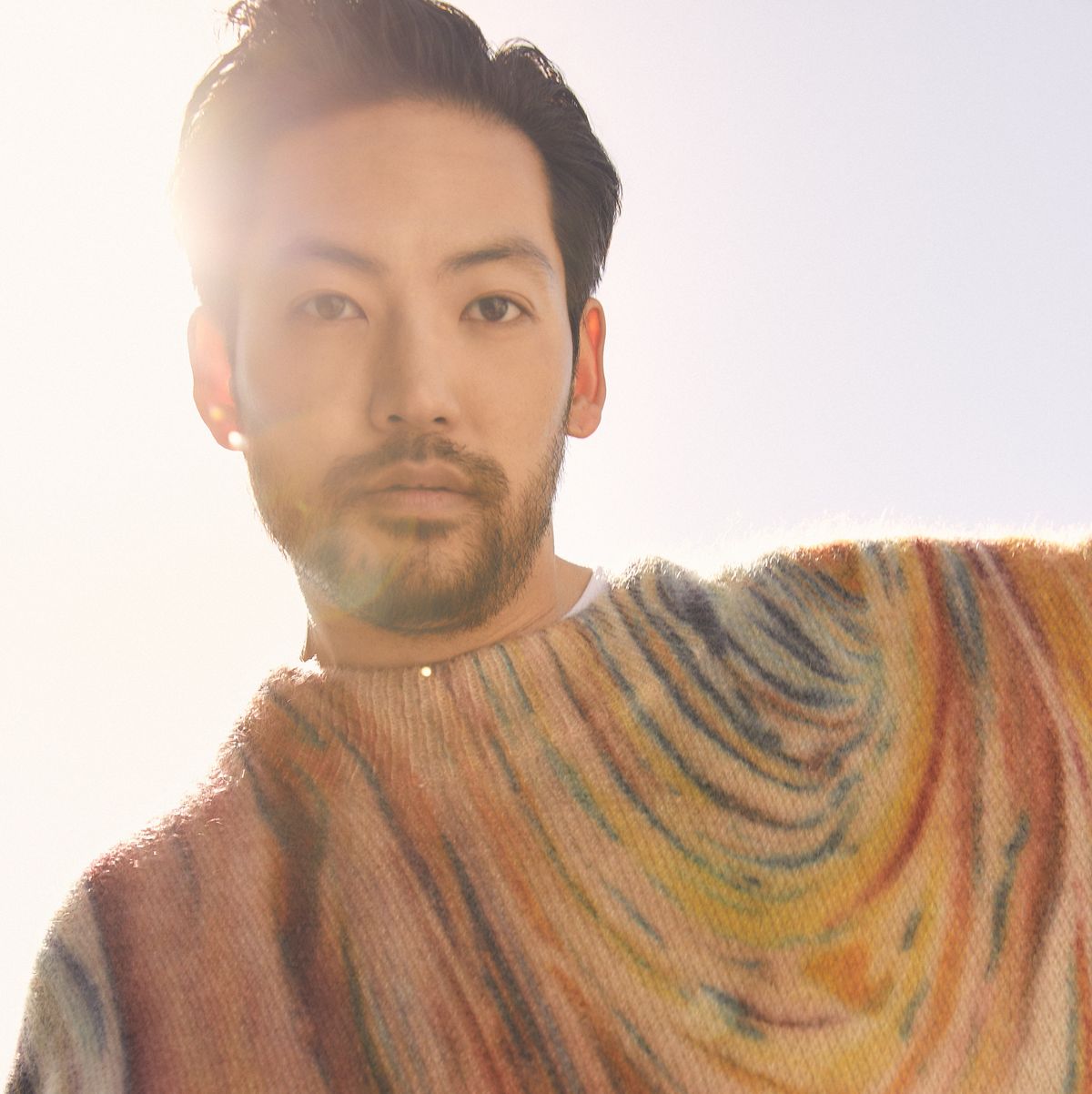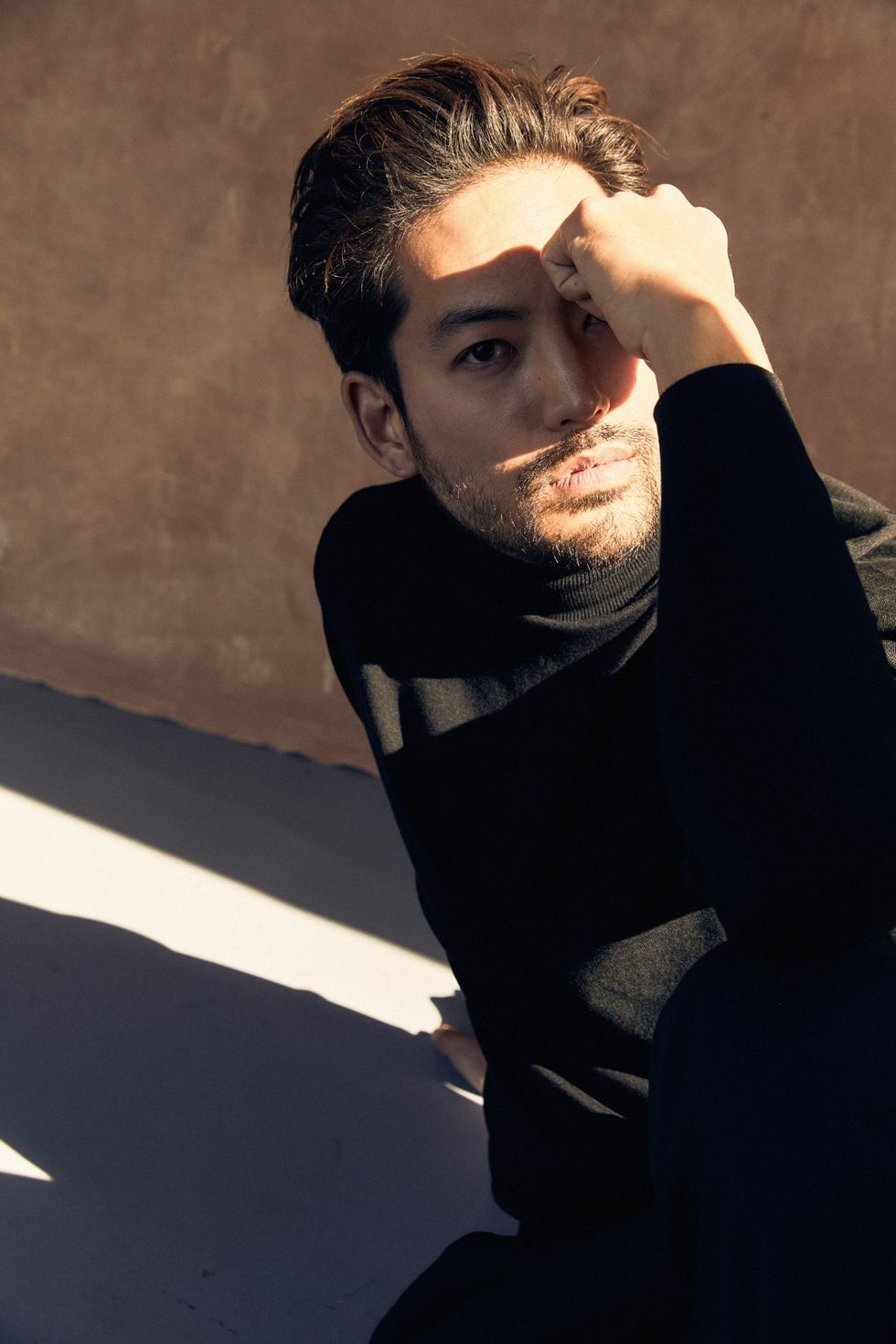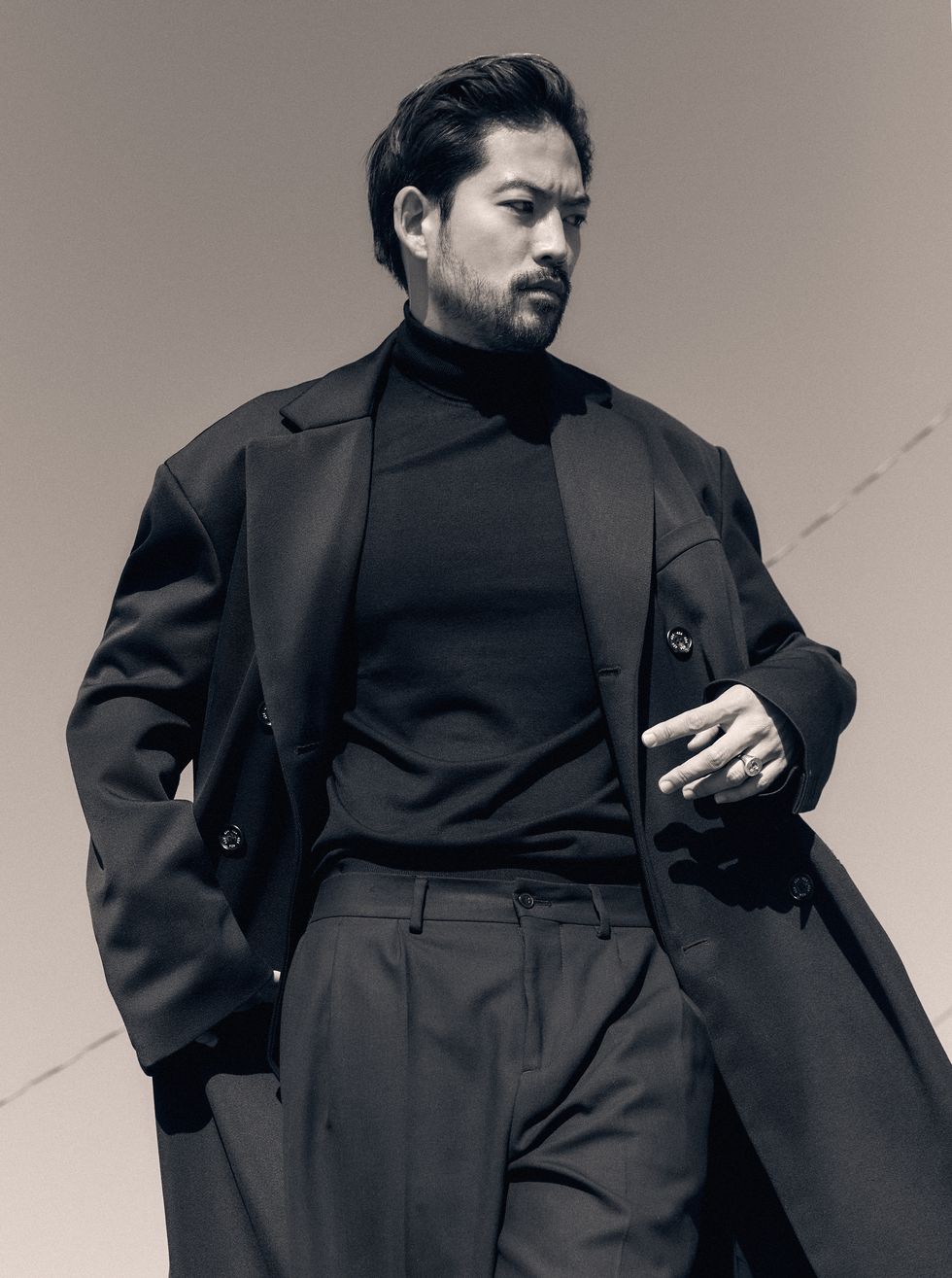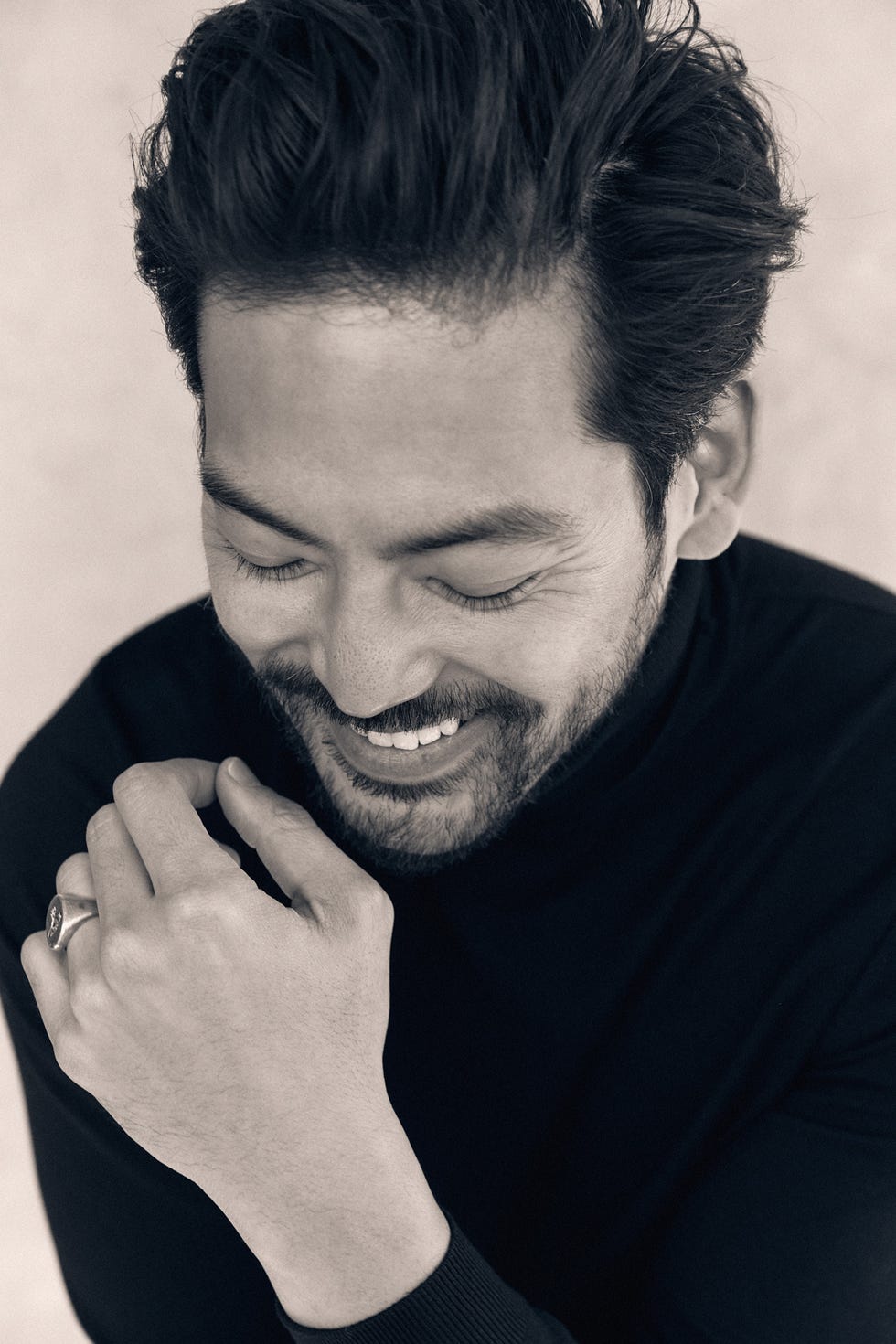Have you ever wanted to see Steven Yeun downing four Burger King chicken sandwiches in one sitting? How about Ali Wong pointing a gun at her phone? Well, your highly specific wishes have been granted. BEEF, Netflix and A24's new series from Lee Sung Jin, serves up unhinged energy, creative cursing, Incubus covers, and so much more. Of course, BEEF features standout turns from Yeun—who plays Danny Cho, a struggling contractor—and Wong as Amy Lau, an entrepreneur who keeps up a seemingly perfect facade for her family.
By the end of the series, though, it might just be Joseph Lee's George Nakai—Lau's loving husband—who is BEEF's true breakout, as a sculptor struggling with an identity crisis of his own. "Ultimately, he's somebody that doesn't have a firm grasp of his own identity," Lee, 35, tells me over Zoom. "He struggles to find his own sense of masculinity. He's not able to have strong boundaries with the people around him. Throughout the show, you see him struggling to navigate trying to form those boundaries for the first time."
Considering George's big moment in the season finale, we had to ask Lee about all of it: our favourite moments from the show, the lowdown on the "celebration of chairs," a certain hospital-bed scene, and his perspective on BEEF's unrelenting existential questions.
ESQUIRE: As soon as I started watching BEEF, I was like, This guy is going to piss me off. What did you think about George when you first read the script?
JOSEPH LEE: Everything you said is completely understandable and valid. When I first read the script, I just saw this childlike purity for the things that he loves, his art, and his family. He's unafraid to show that love. I felt like I was reconnecting with a lot of those childhood impulses to put on a smile and be joyous—and to not judge myself in my own love for my family. And to be goofy about it. So it was very liberating to play George in that way.
Every character on the show struggles with their own rage. How do you think George deals with his rage?
Not in a healthy way. He's somebody that's so cemented in creating his veneer and facade. That's manifested in a way where he's had to suppress all of his rage, his own identity, his own needs to exist in this world. By human nature, you can only suppress that for so long before it explodes.
I found it so refreshing the way that BEEF captured these characters—who were very Asian American—but they are struggling with things that all human beings have conflict with, like inequality and societal expectations.
I have to credit [BEEF's showrunner] Sonny [Lee Sung Jin]. He's done such an incredible job. When it comes to a lot of art, the more personal you can get, the more universal it becomes. Sonny has taken it one level deeper in showing how these things are informed by culture and class—and how it manifests in good and harmful ways. He's able to really access these dark corners of our psyches. At the end of the day, we're all just trying to tell a human story.
BEEF is so dark, but it's also so funny. One scene that made me laugh was the one when you and Ali Wong are arguing, and you say, “This is a celebration of chairs!”
That line wasn't even in the original script. The scene was going great—but there was just an extra punch-up that may have been necessary. So at one point, we do a take and I look over at Sonny. He's just pondering to himself, then he sticks his head out and delivers that line. He says to try it. So the next take, we tried it and everyone's dying. I messed up the first initial take because I was cracking up so hard after... We were doing a chemistry read initially for that scene, and there was just this immediate understanding and trust between Ali and I to keep pushing. By the time I walked out of that room, I was doing breathing exercises in my car from the high I was on. I knew how fun this scene was going to be and how exciting of a dance partner I was going to have in Ali.
In BEEF, you get a lot of moments where strangers share their truest feelings to each other. The scene with George and Danny—when they start becoming bros, and Danny has that very emotional reaction to George's art. What was that scene like to play?
I was really able to connect to George specifically in that moment because I'm also a fine artist. To a certain degree, every artist has insecurity about themselves and their work. So the feeling of wanting that immediate validation from someone, I know that feeling to a T. You're at the edge of your seat, just hoping they like it. The most funny moments and dramatic moments in life, they don't necessarily come from grandiose circumstances. They come from those very specific, day to day things you run into—that you get opinionated about. Or it drives you crazy and brings out some sort of reaction to you.
Let's dive into the finale. Tell me about filming the scene when Danny knocks George out.
It was a hell of a shoot. We had to run through that a few times, where luckily they had protective padding on the wall. We had a stunt coordinator on set who would handle all the weapons, props, and safety concerns. With each movement, he was very detailed and made sure that we were safe at all times. But in terms of the actual movements, it went by pretty fast. Steven and I manoeuvred around to see what was comfortable and what felt natural. Luckily, we had the stunt coordinator there to oversee to see if this looks legit. Then when I smashed my head on the wall, I wanted to make sure that it looked as authentic as possible. I remember seeing it for the first time—I was just blown away. It was just such a fun scene.
What did you think was George's final straw when he asked Amy for a divorce?
He was in this place where all of his protective walls had crumbled, and he doesn't know what's real anymore. George lost his trust in his marriage and his optimism for people through Danny. All he has left is to question what he values and what he is really about. He decides he needs to stick up for himself for the first time in his life. That's what drives him to do what he does. The takeaway from Sonny and his writing is that they're both flawed equally, and they both contributed to this disastrous relationship that they have on their hands.
In the ninth episode, we see what Amy and Danny are going through while they're being held hostage at Jordan's place and what happens after. But I was curious about what was going on with George. What do you think George does after he got the call from Amy from Jordan's house?
I think he's just processing everything that's happened—and building himself up to do what he eventually does. There's just a lot of devastation going on for him in the moment. And then on top of that, he needs to also be a father as well.
Was George looking for Amy? Or was he just totally done with her?
I think he gets this realisation that he has to stick up for himself for the first time. He's been violated in this major way on all fronts. Also, he can't escape the reality of him being a father and having to protect June as well. I think his first priority is to be a father. Then after that, he does look for Amy. Not exactly with a plan. I don't think he's running around with a gun thinking that he's immediately going to find them. But I think in the end, when he sees Danny, he believes he sees Danny hurting Amy from far away. He has a very instinctual reaction to fire that gun. And then, I guess you'll just have to wait and see.
What did you think of that scene when you first read it?
JL: I was as surprised as anybody else. I assumed they'd leave George's situation open-ended and allow the audience to marinate in their own conclusions. But as soon as I opened that page and read George's name, I was completely blown away and very surprised—but with a giant smile on my face.
What's your take on the final scene—when Amy climbs into the hospital bed with Danny?
Oh, man, I was crying. Yeah, it was such a beautiful scene. It was so beautifully written. I was crying throughout the entire episode. It really is a reconciliation—and more so a recognition. They both see themselves in each other, and so there's these moments of genuine embracing of who they are with all of their flaws. There's a real vulnerability and transparency for them to drop all of their guards and egos, just to be able to be with each other. That's a beautiful way that Sonny is able to tie up this whole chaotic situation.
I resonated with what Amy and Danny talked about—about how negativity that comes out of your parents can be regurgitated into the world.
Your trauma is only an extension of yourself and where you come from. It's not really specific to only your own existence in that moment. It's just one of those kind of touchpoints that Sonny really delves into, because generational trauma is so specific to the immigrant story. And I struggle with this myself. It's tough to articulate. It's really tough to even be vulnerable about, because so much of it is culturally still somewhat taboo. When you're a part of projects like this, [you can] make it more palatable for people to be able to digest and start their own discourse about these basic things that all of us go through. There's healing from that. At the end of the day, that's what art is all about.
Sirena He is an editorial assistant and writer who focuses on media and culture. She is a lover of horror films and believes in the healing power of storytelling.
















